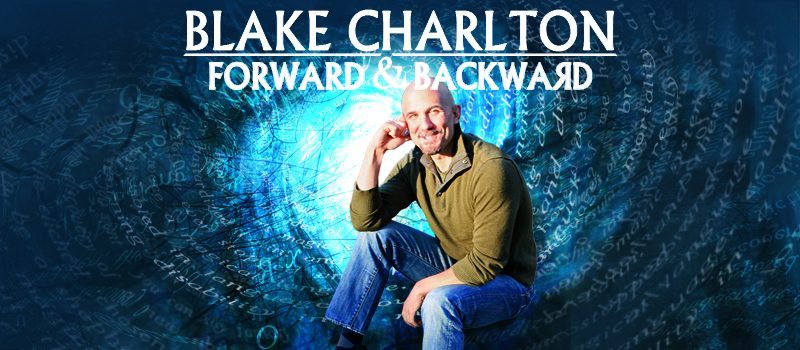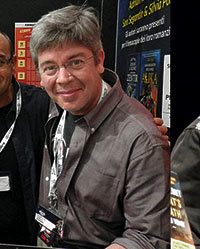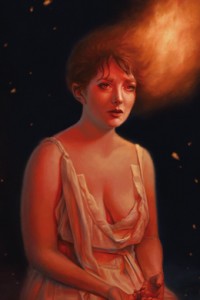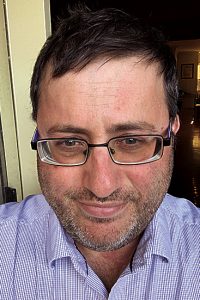Blake Charlton: Forward & Backward
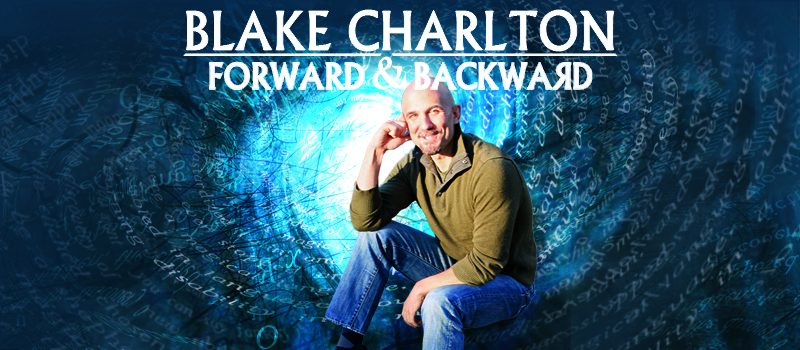
Blake Randolph Charlton was born December 30, 1979 ‘‘on Stanford campus, quite literally,’’ where his parents were faculty in psychiatry. He was diagnosed with dyslexia in kindergarten and spent much of elementary school in special ed classes. He excelled at sports, but at age 12 still couldn’t read a book on his own, until a love for SF and fantasy led him to books by Robert Jordan, Ursula K. Le Guin, and other fantasy writers. He soon began to excel academically, and attended Yale University as an undergrad, where he began writing a book about a dyslexic student of magic.
After graduation, he wrote his first novel while working various jobs, including as a medical writer, an English teacher, and a JV football coach at a New England boarding school. He returned to Northern California as a private tutor and freelance medical writer. He finished his first novel Spellwright while helping to care for his father during an illness, and sold it in 2006. He was admitted to Stanford Medical School, and while there rewrote Spellwright. The novel appeared in 2010, and was followed by sequels Spellbound (2011) and Spellbreaker (2016). Charlton is currently a cardiology fellow at UCSF.
Excerpts from the interview:
‘‘You’d think failing kindergarten would be difficult to do, but I did it rather spectacularly. I have a pretty good auditory memory, and it was expected towards the end of kindergarten that you would take turns reading a page of a picture book to the class. I was very anxious about this, so I brought the picture book home, and my mother would read it to me and I would memorize whatever she said with whatever page was open. The book went around the class, and soon after that my parents got called in. My teacher said, ‘When Blake had the book, he held it upside down when he read from it.’ That’s not because of dyslexia; it’s because I didn’t know what the hell was going on. That’s when my family knew something was up. I was pulled out of normal first grade and sent to special ed. I rode the short bus with a lot of other special needs kids, and went to a magnet school. My parents, being psychiatrists, were intensely interested and worried about my difference. At the time I felt I was being persecuted and segregated, and wasn’t it awful to have to ride the short bus and be called ‘retard’ by all the other kids. It was only later in life that I looked back and realized how privileged I was, and how lucky to receive such an early diagnosis. I’m a member of what I think of as Generation Zero for dyslexia – the first generation that was diagnosed at a young age.”
…
‘‘In fantasy there’s often a linguistic component to magic. Ursula Le Guin, in the Earthsea series, has this idea of a True Language, and Harry Potter’s magic system is more or less bastardized Latin, and then there are runes. No one ever stopped and thought that, if there were a magical language, and people are disabled in language, couldn’t you have a learning disability in a magical language? That idea led to Spellwright, my first book. Someone called it ‘Harry Potter in the special ed classroom.’ It’s basically an academy story but the hero turns out to have a learning disability. As the series goes on, it’s about trying to dig deeper into the themes of ability, disability, and language in the fantastic.
‘‘The science of dyslexia is phenomenal. I’m not an expert – I’m not a neurologist, and I’m not even a teacher, though I used to be a special ed teacher. But I do know there are different types of dyslexia, and mine is caused by the rejection of a degenerate phonemic code. For example, when I speak basic Spanish with my patients now, and write things down in Spanish, I don’t misspell. If you can say a word in Spanish, you can spell it. Maybe you don’t know if it’s a B or a V or an S or a Z, but you can figure it out pretty easily. It sounds the same. You won’t confuse anyone. Contrast that with English. You can imagine telling a little dyslexic boy like me, ‘This is an F, it makes a ‘‘ff’’ sound.’ You’re like, ‘Great, now I know everything that’s going to make a ‘‘ff’’ sound.’ Then they say, ‘This is a word, ‘‘enough’’, what does it say?’ And you’re like, ‘Enow.’ And they say, ‘No, it’s enuff.’ Oh, I got it. Then they ask ‘What’s ‘‘bough?’’’ And you say, ‘That’s buff.’ They say, ‘No, it’s ‘‘bow.’’’ You can go on and on with the crazy things English does for various historical reasons.”
…
‘‘The first book was written when I was having the revelation that many disabled people have in early adulthood, which is that, when they were younger, they waxed and waned between these flares of self-hatred and self-doubt: trying to wish away the part of them that was different, and then trying to accept themselves, and like themselves. The first book is really about dealing with the part of you that is broken. Is it really broken? How do you define broken? It’s a celebration of the fact that if you’ve been broken and you put yourself back together, there’s a beauty in that. It was a young man’s book, and it had its flaws, but I hope people think it was heartfelt, and it dealt with that central question. The second book, Spellbound, was written as a medical student when I was, every day, dissecting a corpse. The immediacy of life and death, even though it is fairly mild compared to what I would experience later as a physician, completely controls your world. The second book focuses on Francesca, who’s dealing with being a young physician, and is overwhelmed with the shock of life and death situations, realizing she has been more intimately tied up in the goings-on of the world than she knew. When I was a kid there was this very nerdy computer game series called Quest for Glory, and every installment had an element and an environment. This is extremely nerdy, but all my books also have an element and a setting. Book one was supposed to be a disabled person dealing with disability, and the element is earth and the direction is down – he’s going down into this old environment. Book two is about healing. The direction is up and the focus is romance and the element is air, with the airships and everyone flying around.
‘‘With book three, Spellbreaker, I wanted to push the envelope and make it about death and mortality. There’s this young woman, Leandra, growing up with a fatal disease, and for her whole life she’s known she’ll die young. When I was an intern, I first started pronouncing people dead. You’re called by the nurse, ‘Mr. So-and-So has passed away, can you please come pronounce him?’ I’ve done it for hundreds of people. You’re there, and you’re holding their hands. For the vast majority of people in modern industrialized society, death is something totally separated from us. I think that’s unnatural. The natural state of human beings is that you’re born into a society where death is prevalent. Your siblings might die. Your parents might die. People died and were born in your house. When you become a doctor, you are reverted back to that natural state. You’re there to pronounce a patient, and you get really good at knowing when someone’s dead. It’s like that crocodile in Peter Pan: you start to hear the alarm clock in the crocodile. Even though you’re young and you’re finally achieving the dream of becoming a young physician after so much work, you realize that no matter how much time is left, there’s not enough. That’s the focus of book three. Even though Leandra has a special situation – she’s going to die young – I wanted to try and extrapolate that to all of us, and let us all hear that clock ticking. And of course I wanted her to be fun and snarky.”
…
“My next book, I hope, takes place in San Francisco, in the modern day. It was inspired when my then-seven-year-old niece told me to write a ghost story about the hospital in which I work. It’s about a young girl who can talk to disease. Diseases talk to her; they have little voices that she can hear. Her uncle happens to be a medical resident in the hospital, and strange things start happening. The elevator pitch in my mind is, ‘Abraham Verghese and Neil Gaiman have a love child who goes to medical school.’ Or the other way to say that is ‘Abraham Verghese rewrites American Gods.’ There may be two other people in the world who know what I’m talking about. But the book will be more about life and death, modern society, and all the amazing social, political, ethnic, and linguistic conflicts that arise in the hospital, and how we’ve built these temples where we go to be born and die, because we’ve decided to separate ourselves from these parts of life.’’
Read the complete interview in the January 2017 issue of Locus Magazine. Interview design by Francesca Myman.


